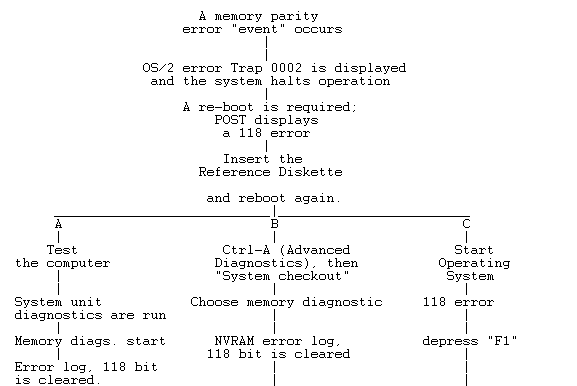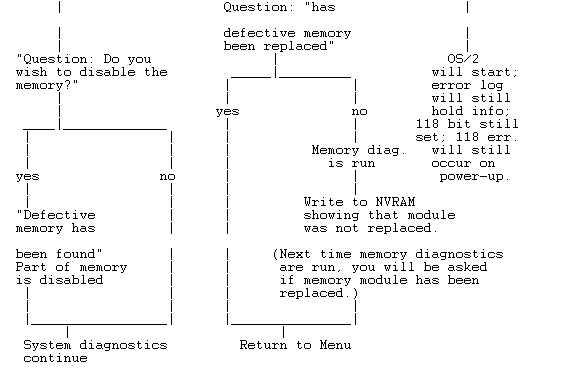

|
49.168 bytes |
Service Hints & Tips |
Document ID: MCGN-42APXD |
IBM PC 8590 / PC Server 8595 - 118 errors during POST on 8590 and 8595 systems
Applicable to: AP-S, Canada, LA, United States
Source: RETAIN tip H083955
Abstract: 118 errors during POST on 8590 and 8595 systems.
TEXT:
118 POST (Power-On System Test) errors.
The following information is provided to explain the memory error logging process of the PS/2 8590 and 8595 systems:
During normal system operation, if a memory parity error occurs, the PS/2 8590 and 8595 system BIOS NMI (Non-maskable
interrupt) handler captures and stores the location (A1, B1 etc.) of the memory SIM which was being addressed when the failure occurred. This information is transferred from the hardware registers and logged into NVRAM (Non-volatile random access memory). The system halts and a re-IPL is required.
Upon rebooting, the presence of a parity check entry in NVRAM is detected by PORT, a 118 error is displayed and the reference partition is accessed. From here, three things can be done:
A. Regular Diagnostics can be run. Choose "Test the computer" from the main menu.
B. Advanced Diagnostics can be run. Type Ctrl-A and choose "System checkout" from the menu.
C. The operating system can be loaded. Choose "Start Operating System" from the main menu.
When the memory diagnostic is run, it moves the entry from the NVRAM error log to a private error log (maintained by the diagnostic), allowing POST to once again run, without the 118 POST error.
The following message is then displayed: "The memory module in location XX has previously been found defective. Has it been replaced? (This message is not displayed on a red screen due to a diagnostic limitation.)
This points to the memory module location which was being addressed when the parity error occurred (the location of the failing memory SIM).
This question is asked in order to determine when to erase the failing module location data. If a "yes" response is not entered, the question will be displayed every time the memory diagnostic is run, until a "yes" response is given.
A random memory parity error (caused by a noise spike, etc., as an isolated occurrence), does not necessarily mean that a memory SIM is defective.
Highly intermittent memory errors (a failure once a week, etc.) will probably log the same failing SIM location consistently. A second error logged against a SIM location will cause that SIM to be de-allocated (by-passed) and the system will remain operational, if there is enough memory remaining to support the software involved. The exact amount of memory disabled depends upon several factors beyond the scope of this tip.
Replacement of a SIM which is consistently identified as failing is recommended.
This process enables the servicer to know which memory SIM is suspect, rather than replacing all of the memory on the system board.
The following chart provides additional information useful in choosing the correct action to take in resolving memory parity and 118 POST error events.


SAS KEYWORDS:
PSY2, PSY2DIAG, PSY2MEM, PSY2ERR, 8590SYSERR, 8590SYSDIAG, 8590SYSMEM, 8595SYSDIAG, 8595SYSMEM, 8595SYSERR, D/T8590, PS2, PS/2, D/T9595, D/T9576, D/T9577
|
Search Keywords |
PSY2, PSY2DIAG, PSY2MEM, PSY2ERR, 8590SYSERR, 8590SYSDIAG, 8590SYSMEM, 8595SYSDIAG, 8595SYSMEM, 8595SYSERR, D/T8590, PS2, PS/2, D/T9595, D/T9576, D/T9577 | |
|
Hint Category |
Retain | |
|
Date Created |
16-11-98 | |
|
Last Updated |
16-11-98 | |
|
Revision Date |
16-11-99 | |
|
Brand |
IBM PC, IBM PC Server | |
|
Product Family |
PS/2, Server 95 | |
|
Machine Type |
8590, 8595 | |
|
Model |
ALL | |
|
TypeModel |
| |
|
Retain Tip (if applicable) |
H083955 | |
|
Reverse Doclinks |
Date last altered: A93/01/27 |